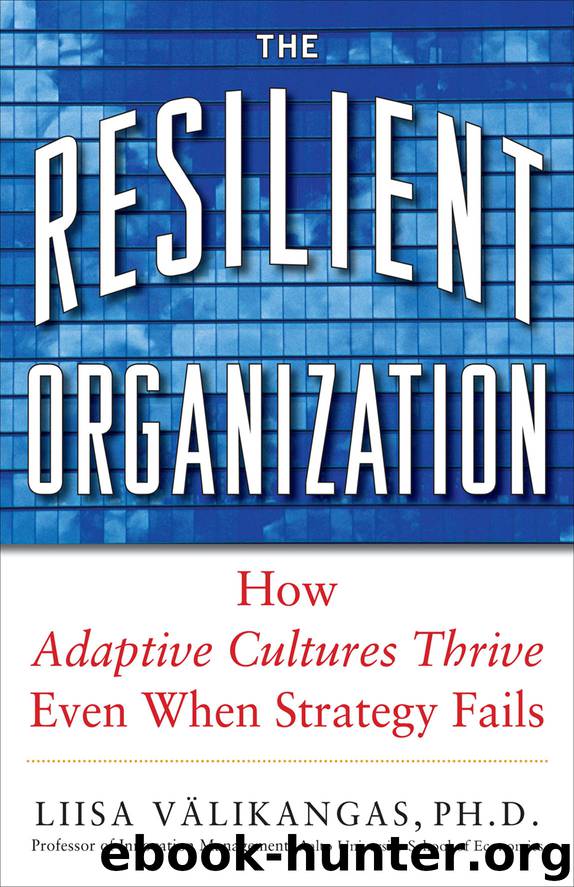The Resilient Organization: How Adaptive Cultures Thrive Even When Strategy Fails by Liisa Välikangas

Author:Liisa Välikangas
Language: eng
Format: epub
Published: 2018-11-20T00:00:00+00:00
BORROWED TIME CALLS FOR STRATEGIC IMAGINATION
In many respects, ODD was living on borrowed time, and the ODDsters knew it. When you believe passionately in your ideas and sense that time is short, you find creative ways to promote them. To this end, ODDsters developed strategic infection points (SIPs)—points in the organizational process at which they could introduce new strategic perspectives.
A SIP might be a neglected internal newsletter, ripe for hijacking by an undercover heretic who’d “like to help out” in its production and eventually wrest editorial control. Or a SIP might be a draft copy of an official corporate strategy document. After managing to commandeer a draft of the CSP’s 1997 AT&T Strategy and Business Planning, ODD issued a much-revised version of the document. The “new” version got a lot more attention than any of the earlier editions had, and the CEO even requested that copies be circulated to the board.
But the best SIPs were often human rather than paper based. Indeed, ODD used a term especially for the human kind: empty suits. Empty suits were up-and-coming executives who needed ideas and had no problem adopting those of others. Because ODDsters cared more for the wider interest of AT&T’s survival than for the narrower interest of gaining credit for their ideas, this relationship with the empty suits worked well. ODD would judge the success of its hijacking of empty suits by listening to whether its ideas (and ODD vocabulary) were making headway in the organization. A success meant that an ODD-initiated idea was claimed by an empty suit and introduced as his or her own in an executive, or even investor, meeting. A few empty suits quickly learned to ride a part of their career on the ODD idea. It was impact—not credit—ODD wanted. SIPs and empty suits are just a couple of examples of the unusual approaches and rich vocabulary conceived by ODD.
Not so long ago, a disaffected employee in one of America’s largest companies caught up with me at a conference where I was speaking. In his hands was the company’s glossy new performance assessment manual. . . . He drew my attention to the fact that only “senior executives” were to be accountable for “creating strategy.” The performance criteria for “managers” and “associates” said not a word about strategy. Vibrating with indignation, he accused his employer of being uniquely stupid in having excused 99 percent of its employees from any responsibility for strategic thinking.
Surely, no other company would be so backward as to assume that only top executives could create strategy. Yes, I assured him, he had a right to be indignant. But no, his company was far from unique.
—Gary Hamel
Other nomenclature includes data bombs, freight trains, and canaries. Besides adding some fun to a difficult work environment, the code language helped ODD to establish its brand and group identity and to track the adoption of its ideas. Realizing that it was a small group with a big mission and enormous territory to conquer, ODD’s distinctive approach
Download
This site does not store any files on its server. We only index and link to content provided by other sites. Please contact the content providers to delete copyright contents if any and email us, we'll remove relevant links or contents immediately.
Hit Refresh by Satya Nadella(9123)
The Compound Effect by Darren Hardy(8941)
Change Your Questions, Change Your Life by Marilee Adams(7757)
Nudge - Improving Decisions about Health, Wealth, and Happiness by Thaler Sunstein(7689)
The Black Swan by Nassim Nicholas Taleb(7106)
Deep Work by Cal Newport(7063)
Rich Dad Poor Dad by Robert T. Kiyosaki(6603)
Daring Greatly by Brene Brown(6501)
Principles: Life and Work by Ray Dalio(6416)
Playing to Win_ How Strategy Really Works by A.G. Lafley & Roger L. Martin(6229)
Man-made Catastrophes and Risk Information Concealment by Dmitry Chernov & Didier Sornette(6002)
Big Magic: Creative Living Beyond Fear by Elizabeth Gilbert(5754)
Digital Minimalism by Cal Newport;(5748)
The Myth of the Strong Leader by Archie Brown(5496)
The Slight Edge by Jeff Olson(5410)
Discipline Equals Freedom by Jocko Willink(5378)
The Motivation Myth by Jeff Haden(5203)
The Laws of Human Nature by Robert Greene(5171)
Stone's Rules by Roger Stone(5080)
